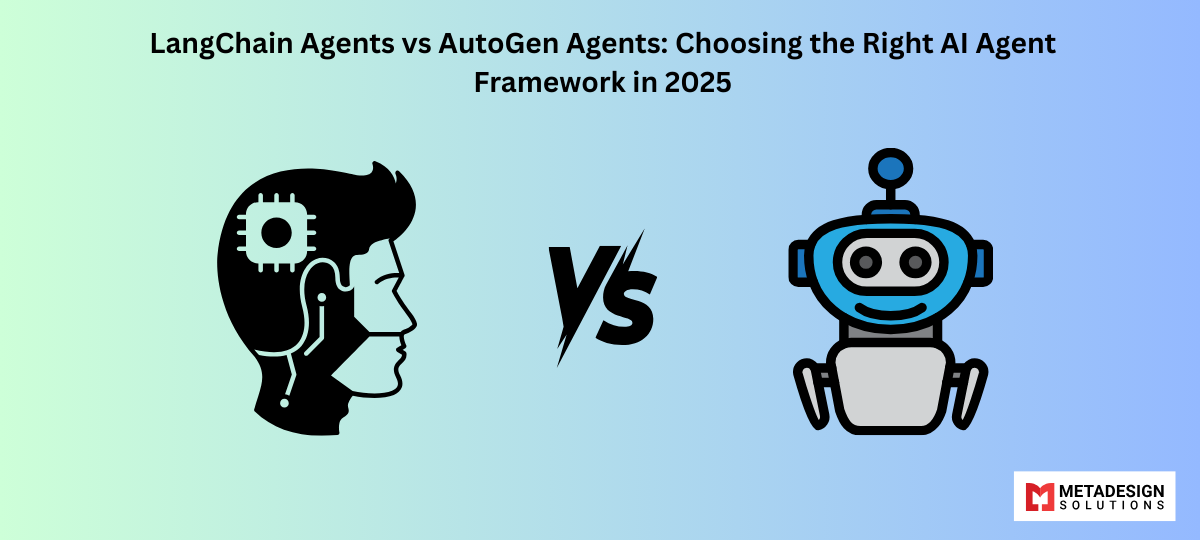Introduction
In the rapidly evolving landscape of AI development in 2025, two powerful frameworks dominate discussions: LangChain and AutoGen. These AI agent frameworks support the creation of advanced, autonomous systems using Large Language Models (LLMs) and natural language processing (NLP) capabilities. But which one is the right choice for your business?
This detailed comparison explores their architectures, features, ideal use cases, performance metrics, and community support to help you choose the best fit for your AI project.
Understanding LangChain and AutoGen
LangChain: Modular and Composable AI Workflows
LangChain is a leading open-source framework for building AI applications that utilize LLMs. It excels in modularity, letting developers chain prompts, models, and tools into flexible workflows. Its ability to integrate with OpenAI, Anthropic, and Hugging Face makes it a go-to choice for developers creating custom LLM applications.
AutoGen: Conversational Multi-Agent Systems
Developed by Microsoft, AutoGen is an open-source framework for designing multi-agent AI systems. It uses structured agent roles and natural language conversations to allow agents to collaborate effectively. With tools like AutoGen Studio, it supports rapid prototyping of conversational AI agents.
Architectural Comparison
LangChain Architecture
- Modular AI architecture for composability
- Supports ReAct pattern, Self-Ask, and custom AI agents
- Rich tool integrations and external API support
- Efficient memory management for context retention
AutoGen Architecture
- Uses role-based agents like Coder, Planner, and Reviewer
- Designed for event-driven AI systems
- Facilitates agent-to-agent communication
- Comes with AutoGen Studio for UI-driven workflow design
Use Cases and Applications
Ideal Use Cases for LangChain
- Complex reasoning tasks across enterprise AI platforms
- Multi-step NLP workflows with tool use and memory
- Deep LLM integrations for AI-powered solutions
Ideal Use Cases for AutoGen
- Collaborative AI agents with well-defined roles
- Task automation through conversational flows
- Multi-agent orchestration in smart applications
Performance and Scalability
LangChain
- Leverages modular pipelines to optimize resource use
- Supports asynchronous AI workflows
- Easily scales with cloud-native infrastructure
AutoGen
- Built for distributed multi-agent systems
- Facilitates parallel processing and long-term sessions
- Scalable architecture for complex, concurrent tasks
Choosing Between Langchain and AutoGen?
Schedule a call to get personalized insights and implementation support from enterprise AI specialists.
Community and Ecosystem
LangChain
- Extensive open-source support
- Integration with leading AI libraries
- Thriving ecosystem for AI developers
AutoGen
- Backed by Microsoft, ensuring continuous updates
- Includes powerful GUI tools for rapid deployment
- Growing community of AI engineers and researchers
Which One to Choose in 2025?
When selecting between LangChain and AutoGen, consider the following:
- Choose LangChain for:
- Custom LLM integrations
- Complex, non-linear workflows
- Need for tool-based AI agent reasoning
- Choose AutoGen for:
- Fast deployment of multi-agent systems
- Conversational AI agents using natural dialogues
- Projects requiring collaborative agent workflows
Why MetaDesign Solutions?
At MetaDesign Solutions, we help you implement cutting-edge AI frameworks with tailored consultation and development services:
Whether it’s building LangChain-powered agents or designing AutoGen ecosystems, our experts ensure smooth, scalable, and secure deployment of your AI solutions.
📅 Book a consultation today to get started with your intelligent automation journey.
Related Hashtags:
#LangChain #AutoGen #AIagents #AIdevelopment #LLM #NLP #GenerativeAI #OpenAI #LangChainAgents #AutoGenAgents #ReActPattern #AIFrameworks #ArtificialIntelligence #MachineLearning #MetaDesignSolutions #SmartAutomation
